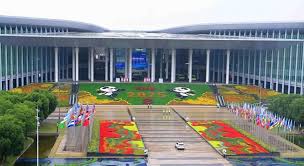By Ma Yuxia
The China International Import Expo (CIIE) is the world’s first national-level expo dedicated to imports, and alpaca is a “fluffy elf” from the Andes Mountains. They once seemed to have nothing to do with my life. Yet, as China expanded its global openness, these elements converged into a transcontinental economic bond that transformed my career and thousands of Peruvian artisans’ livelihoods.
This story began unexpectedly in 2016. Before returning from Peru, I purchased handmade alpaca wool dolls asclients gifts. That same evening, a client called requesting 1,000 more units – revealing the Chinese market’s vast potential for quality products.
I partnered with Peruvian artisan Osvaldo Mamani, whose family workshop could barely produce a few pieces daily. Mobilizing his entire household, they delivered the order after four months. However, limited production capacity and sales channels stalled our business for two years.
The turning point came in 2018 when I applied for the inaugural CIIE. Despite doubts about small businesses fitting a “national-level event,” we secured a 9m²booth. During the expo, crowds surrounded our stand daily, selling all samples before closing. CIIE proved China’s market values quality over company size – where even modest ventures can thrive.
Post-expo, we received international orders from Russia, the U.S., Canada, and Iceland. To strengthen our brand “Warmpaca”, I brought Peruvian artisans to subsequent CIIE editions. They refined craftsmanship based on consumer feedback, expanding from single dolls to over 10 product lines. Today, “Warmpaca” operates five stores, partners with more than 200 Peruvian artisan families, and exports nearly 10,000 alpaca products monthly.
The CIIE has unlocked transformative opportunities for global businesses while uplifting communities across developing countries. Take Mamani for example. When we first met, his family crafted goods in a modest shack, selling them from a simple wooden stall. By 2019, driven by CIIE-generated orders, he constructed a new home and hired relatives to expand production. By 2023, his enterprise had flourished so dramatically that he built a three-story villa, with over 20 family members forming a local production cluster nearby. This year, he purchased two off-road vehicles, and his neighbors have likewise upgraded their homes. “It feels like a dream,” Mamani often tells me, “except I’m fortunate enough to live it.”
For artisans like Mamani, China has become a place where aspirations materialize – where dreams transform into tangible realities, filling lives with renewed hope.
A pivotal moment came in November 2024, when the China-Peru jointly developed Chancay Port commenced operations. Shipping times for our alpaca products from Peru to China plummeted from 60 to 24 days, drastically reducing costs. As our nations deepen cooperation, we are not merely beneficiaries but active witnesses to this historic progress.
I recall initial hesitancy among Peruvian artisans toward collaboration. Today, however, they associate Chinese visitors with opportunity and partnership. In every village we enter, we’re met with warmth – a trust forged through shared success. Growing numbers internationally recognize that engaging China means embracing opportunity; believing in China means investing in a brighter future.
As a seasoned CIIE participant, our “Warmpaca” brand has thrived within China’s steadfast commitment to openness. Recently, I’ve observed more small enterprises from Africa and Latin America following this pathway into the Chinese market through the CIIE. On this vast, inclusive stage, I’m confident countless businesses will replicate such success – proving that exceptional products, when given the right platform, can bring joy and prosperity to families worldwide.
(Ma Yuxia is the founder of Warmpaca. This story was compiled and written by People’s Daily journalist Chang Jin.)
CIIE Story: How Peruvian alpaca goods find their big stage

Leave a Reply